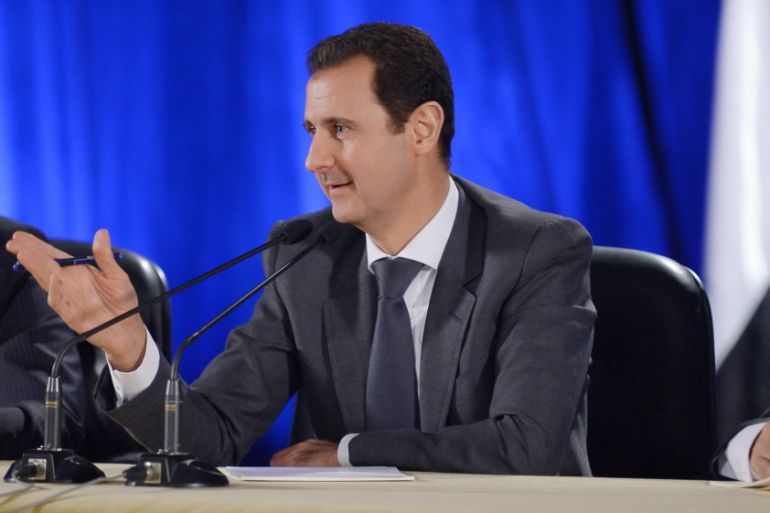Panic in Damascus?
The panoply of rebel movements appears incapable of administering a decisive blow to Assad’s regime.

The view that 2015 has not been a particularly good year for Syrian President Bashar al-Assad has much to recommend it.
Within Syria, the government has lost control over most of the province of Idlib, and was recently dislodged from Palmyra by the Islamic State of Iraq and the Levant (ISIL).
Keep reading
list of 4 itemsThe Take: Thirteen years later, has the world forgotten Syria?
Jordan army kills drug runners at Syria border amid soaring Captagon trade
Assad arrest warrant: ‘Hope and pain’ for Syrian chemical attack survivors
The key cities of Aleppo in the north and Deraa in the south remain under threat; increased coordination among Syria’s notoriously fractious armed rebel groups is an important factor in this regard, as is improved relations among their sponsors.
|
|
| Inside Story: Can rebels unite against Assad? |
Damascus now openly admits it is confronting manpower issues.
Perhaps most importantly, Turkey recently commenced air raids within Syria.
Although formally directed at ISIL and thus signalling Ankara’s belated entry to the US-led anti-ISIL coalition, many believe its primary purpose is to prevent territorial consolidation by the Kurdish Democratic Union Party (PYD) and lay the basis for a safe haven on the Syrian side of the border.
Indeed, many view this agenda as the quid-pro-quo offered by the US in exchange for permission to use Turkey’s Incirlik airbase.
The political front
On the political front, the US, Britain, and France have dashed Assad’s hopes that they will reconcile with him to meet the growing ISIL threat, and remain adamantly opposed to granting him renewed international legitimacy.
Russia, Assad’s main diplomatic ally, has meanwhile been pressing for the formation of a “government of national unity” that would include opposition forces, while seeking to promote a regional anti-ISIL alliance that would include Assad and those most determined to unseat him.
|
|
| Syria’s Assad admits his army’s troubles |
Meanwhile, the Syrian economy, which many believe forms a greater threat to Assad’s survival than rebel groups, continues to deteriorate.
Presiding over a weakened state, society, military, and economy, one would expect Assad to be preoccupied with the spectre of an imminent tipping point.
Yet there is little sign of panic in Damascus, and this is only partly the result of denial and delusion.
While Assad’s July 26 speech was a rare public admission of reality, it would be a mistake to interpret his words as an admission of weakness or imminent defeat.
Key issue for Assad
Territorially, the key issue for Assad is his continued control over Damascus and the coastal region, and secure access to Lebanon.
The former remain secure, while the latter has been significantly enhanced by the recent advances of government forces and their Hezbollah allies in the Qalamoun region.
Similarly, rebel offensives in the far north and south of Syria appear to have stalled.
This is partly on account of renewed rebel infighting, and Assad will have taken particular pleasure in the recent capture of US-backed “Division 30” personnel by the Nusra Front – effectively putting paid to attempts to reinvent this group as free of al-Qaeda associations.
With its constant refrain that the only alternative to Assad is a Taliban on steroids, Damascus is convinced the world is belatedly seeing the light.
Turkey’s intervention in Syria also poses less of a threat than meets the eye.
As the US has made clear, there is no agreement to establish a safe zone, much less a no-fly one, on Syrian territory.
Turkey’s position
Turkey is not in a position to impose a no-fly zone unilaterally.
This additionally means there is little prospect of Turkey engaging in direct hostilities against the Syrian military.
And to the extent Turkey weakens the PYD, it is likely to make the Kurds more amenable to restoring the loose alliance maintained with Damascus after a year in which they explored alternatives that seemed more supportive of their ambitions.
|
Assad believes he has reversed the conventional wisdom of guerrilla warfare, and that rather than losing because he has not won, he is winning because he has not been defeated.
|
Seen from Damascus, Ankara is both its nemesis and a threat in decline.
Increasingly constrained by the US and NATO, neither of which will sign off on direct intervention to remove Assad or significantly weaken him, Turkish President Recep Tayyip Erdogan is additionally experiencing domestic problems of his own.
His former Justice and Development Party (AK party) recently failed to win an unambiguous electoral majority, and may face another election this year amid declining economic performance, domestic unrest, and renewed hostilities with Turkey’s Kurdish population.
By dint of geography and policy, Turkey, and Erdogan personally, are seen as the primary sponsors and enablers of the armed rebellion in Syria, and anything that diverts Ankara is therefore considered an achievement.
Pursuing an agenda
Assad also does not see much of a political threat.
Among his main allies only Russia seems keen for change – limited and managed rather than real transition.
Even so, it cannot pursue this agenda beyond what a recalcitrant Damascus is prepared to concede, because removing Assad from the equation is likely to lead to regime implosion and the collapse of Moscow’s remaining influence in the Eastern Mediterranean.
And while Damascus may be cool to the idea of a regional anti-ISIL coalition, it has used Russia’s sponsorship of this proposal to recently resume contact with Saudi Arabia at the highest levels.
RELATED: Turkey’s AKP: Sailing into uncharted waters
The Syrian government also does not appear to be perturbed by the Iran nuclear agreement.
Unlike many Gulf states, it discounts the possibility this will result in a strategic realignment by its most committed ally, and believes Tehran will be in a stronger position to support it, particularly economically.
It also has solid grounds for believing Damascus will become more valuable to Tehran as the Iranian-Saudi regional proxy conflict continues unabated.
Winning by lack of defeat
Assad believes he has reversed the conventional wisdom of guerrilla warfare, and that rather than losing because he has not won, he is winning because he has not been defeated.
The panoply of rebel movements appears incapable of administering a decisive blow to the regime.

The ability of outside parties, particularly Turkey, to fundamentally alter this equation is more restricted than before, and it would take major developments for foreign powers to seriously contemplate decisive intervention.
Yet, for all its conviction that it has survived the worst and is no longer at existential risk, the pertinent reality is that, in the words of Syria analyst Bassam Haddad, “the regime’s territorial losses are mostly irreversible”.
Given the implications, this suggests that the Assad regime’s very survival will eventually hang in the balance.
Mouin Rabbani is an independent Middle East analyst based in Amman, Jordan. He is a co-editor of Jadaliyya, a senior fellow with the Institute for Palestine Studies, and contributing editor to the Middle East Report.
The views expressed in this article are the author’s own and do not necessarily reflect Al Jazeera’s editorial policy.
